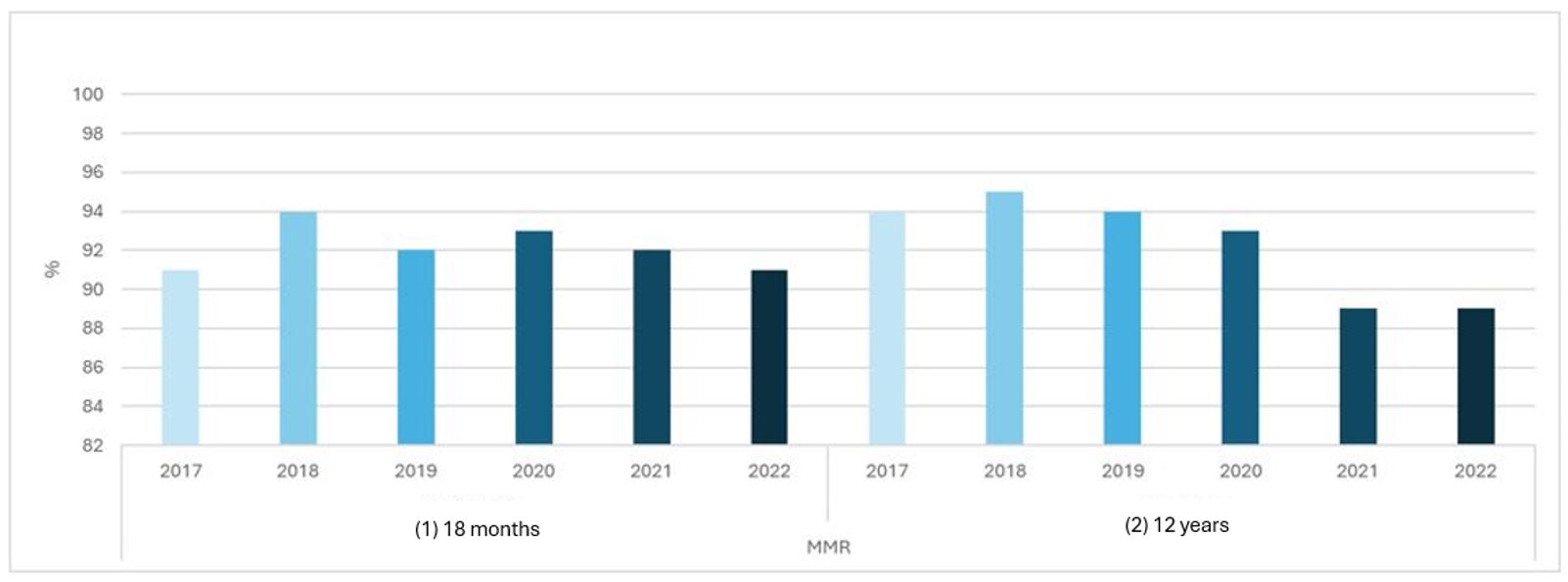Participation in General Vaccinations
30th April 2024
General vaccinations in Iceland refer to vaccination programs organized and coordinated nationwide by the Chief Epidemiologist, in accordance with the Act on Health Security and Communicable Diseases. These vaccinations are administered by the primary care service.


As per regulations, vaccinations organized by the Chief Epidemiologist are provided free of charge to children residing in Iceland. It's important to note that all vaccinations in Iceland are voluntary, and individuals have the choice to participate based on their own decisions and preferences.
Effectiveness of Vaccinations
Vaccination stands as our best defense against infectious diseases. By educating the immune system on how to combat diseases, vaccines significantly reduce the risk of severe illness and can prevent disease transmission. There are vaccines available against a wide range of diseases and some vaccinations offer protection against multiple diseases with the same injection.
Most vaccines contain weakened or inactive forms of viruses or bacteria, triggering the immune system to produce antibodies and memory cells. This prepares the body to swiftly respond to future encounters if the person comes into contact with the actual virus or bacteria, providing robust protection.
The World Health Organization (WHO) estimates that vaccination prevents 3.5 to 5 million deaths globally each year from diseases such as diphtheria, tetanus, pertussis, and measles. Before vaccinations against measles became widespread, outbreaks occurred every 2-3 years with about 2.5 million deaths each year. Vaccination not only saves lives but also shields against serious complications such as pneumonia, encephalitis, blind- and deafness.
Vaccine Safety
Before marketing vaccines undergo extensive and rigorous testing in thousands of individuals to ensure safety and effectiveness. Common side effects are the immune system's reaction to vaccination such as transient fever, rash, bone, and muscle pain. Allergic reaction is an uncommon adverse event.
Ongoing monitoring of possible side effects continues after vaccines are put on the market. Millions of vaccinations are thus followed up in real-life situations so not to miss very rare events. In this way, rare adverse reactions can be discovered if they occur.
The results of such studies have shown that serious side effects to vaccines used in general vaccinations are extremely infrequent, with about 1 side effect per 500 thousand to million vaccinations. This means that in Iceland, we can expect 1 serious adverse reaction about every 40 years, which is a negligible number compared to the beneficial results of vaccinations. Side effects of vaccinations should also be put in the context of serious complications of the diseases being vaccinated against, such as measles.
Serious Complications of Vaccine-Preventable Diseases
Measles is an example of a disease vaccinated against in general vaccinations. Measles can have serious consequences although usually measles get better without causing severe complications. Those most at risk of complications include infants and children with weakened immune systems. If a pregnant woman develops measles, there is a high risk of miscarriage, premature birth, and other problems for the mother and the baby.
Common complications of measles include:
Diarrhea (1 in 10 cases)
Ear infections (1 of 10)
Eye infections (1 in 10, especially malnourished children)
Pneumonia (1 in 20, measles pneumonia can be a life-threatening condition).
An increased incidence of various bacterial infections accompanies measles for at least several months after the measles illness.
Uncommon serious complications include:
Blindness (2 in 1,000 cases, especially malnourished children)
Encephalitis (affects up to 1 in 1,000 people and is a life-threatening condition)
A slow-moving form of encephalitis can occur later, usually 7–10 years after the measles infection and is fatal.
More than one in every 1,000 measles infections in children causes death (mostly in children under 5 years of age).
Vaccination Registration
Accurate vaccination registration is essential for assessing the risk of an outbreak should an vaccine-preventable disease be introduced into the country.
According to regulations all vaccinations are registered by the Chief Epidemiologist. This way, the Chief Epidemiologist monitors participation in general vaccinations and this is reported each year. Real-time monitoring of childhood vaccinations, however, is in the hands of the primary care service. It is crucial to also register vaccinations carried out abroad, e.g. when a child moves between countries, to ensure accurate participation statistics.
Participation in General Vaccination of Children
Childhood vaccinations primarily aim to protect children from serious illnesses. However, widespread participation in general vaccinations is crucial to safeguard the entire community against outbreaks and to protect vulnerable individuals unable to receive vaccination such as infants and immunocompromised individuals.
For general vaccinations, there is a threshold for what constitutes sufficient participation. For some vaccines, the threshold is well defined and there is a known risk of an outbreak if that threshold is not reached (e.g. MMR measles vaccine). For others, the boundaries are based on tradition or calculations.
Though vaccination is among the most successful and cost-effective public health measures globally, achieving optimal participation remains a challenge in some areas. It's imperative for health authorities to understand and address barriers to participation through targeted interventions and educational campaigns. Measles vaccination is an important example, but in 2023 only 4 out of 30 EU/EEA countries reached the 95% target for measles vaccination coverage for both doses (first and second).
In Iceland, participation in the second dose of MMR measles vaccination declined in 2021 and 2022, with participation below 90% in both years (see figure). The COVID-19 pandemic put a strain on the community and the healthcare sector, but preliminary figures for 2023 indicate that the situation has not been corrected. With insufficient participation, there is a risk that measles can spread. We need to embark on a vaccination campaign now, but also follow up with further measures to improve participation.


Figure. Participation in MMR vaccinations (measles, mumps, rubella) at 18 month (1st dose) and 12 years of age (2nd dose) in 2017-2022 in Iceland.
The Chief Epidemiologist
